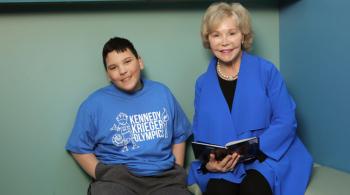By E. Mark Mahone, PhD
Director, Intellectual and Developmental Disabilities Research Center
Kennedy Krieger Institute/The Johns Hopkins University
Fall greetings on behalf of the Kennedy Krieger Institute/Johns Hopkins University Intellectual and Developmental Disabilities Research Center (IDDRC)! In this issue, I will discuss research recruitment registries. Offered through the IDDRC, the registries are a tremendous resource for families and investigators.
A research recruitment registry is essentially a list of families who have agreed to allow IDDRC-supported investigators to contact them about future research study opportunities. The registry aims to simplify the research recruitment process for community members, parents and IDDRC-supported research investigators.
Currently, the IDDRC maintains two types of research recruitment registries: external and internal. Both serve generally the same purpose; however, “external” registries are made up of families from across the country who are not currently clinical patients at Kennedy Krieger Institute. In contrast, “internal” registries include patients and families who are patients at Kennedy Krieger and wish to be considered for future research studies.
To join the IDDRC research recruitment registry, participants (usually parents) must complete a brief online survey. This survey asks for basic contact information for the parent (name, gender, educational level, address, phone number and email address) and information about the child (name, date of birth, gender and any diagnosed conditions).
By joining the registry, parents give permission to Institute investigators to access and use the information provided through the survey. This information is then added to an electronic database that is managed and accessed only by Kennedy Krieger research staff members who routinely search the database for people who meet requirements for different studies throughout Kennedy Krieger.
In addition to providing permission for researchers to add their information to the “external” research registry database, parents give permission to be contacted about research studies at Kennedy Krieger. If the registered child meets the general requirements for participation in a certain study (usually based on age and diagnosis), then parents may be contacted by phone, email and/or mail with information about that specific study. At that point, parents can choose to hear more about the study or decline to participate. Parents can be contacted again if their child meets general requirements for new studies as they emerge. IDDRC staff members monitor the registry list so that parents are not contacted too often.
The current “external” registry at Kennedy Krieger is available for parents of children ages birth through 17 years old. For inclusion in the external research registry, participants (children) must not be registered as current or previous patients of Kennedy Krieger. Previous research participants at Kennedy Krieger who have never been a patient (i.e., those who are included in medical records as research participants only) may be included in the registry.
Joining the research registry does not ensure the child’s participation in research, nor does it enroll the child in any research studies. It simply puts the family on a list for future contact about any relevant studies. Also, participation in the external recruitment research registry does not exclude or affect future care at Kennedy Krieger or Johns Hopkins Medicine. While there is no direct benefit to patients for joining the registry itself, families do increase the likelihood that they will have access to new research opportunities and to investigators who are studying conditions that may be relevant to their child.
In addition, through the Behavioral Phenotyping Core, the IDDRC maintains an internal research registry of more than 8,000 children who have had psychological and neuropsychological assessments at the Institute, and whose guardians have allowed contact about future research projects, if eligible. The resource is available for query by IDDRC-supported investigators for recruitment purposes or for establishment of preliminary data for future studies, with appropriate approval.
Please direct inquiries about the IDDRC external research registry to the center’s project manager, Erin Jones (JonesEri@KennedyKrieger.org).
Families who wish to join the registry can do so by clicking here.
Kennedy Krieger or Johns Hopkins Medicine investigators who wish to access the IDDRC-supported internal or external research registries should complete a services request form here.









